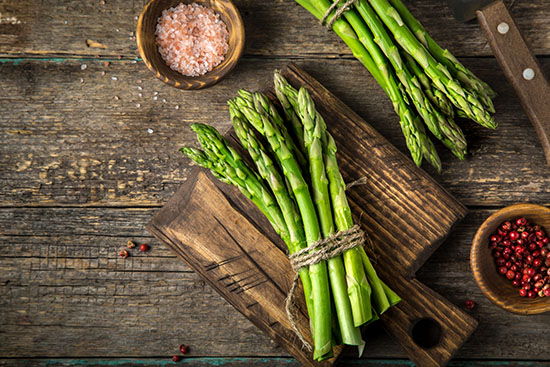
Everyday Chemicals Are Screwing Up Your Testosterone
You may have already read my other article on 7 habits which are killing your testosterone. There was a section in that on Water because

Well-known as an aphrodisiac in ancient times, this odd-looking veggie has a lot of health benefits and contains an incredible blend of nutrients that boost energy, cardiovascular health, help brain function, and even cleanse the urinary tract.
Asparagus contains the nutrient inulin, which isn’t broken down in the digestive tract. It passes, undigested, to the large intestine, where it’s a food source for probiotic bacteria (1).
These bacteria are responsible for optimal nutrient absorption, reduced allergy risk, and reducing the risk of colon cancer (2).
Asparagus is rich in glutathione, a detoxifying compound that may help destroy carcinogens (3).
Researchers consider glutathione so important to our health that glutathione levels in our cells may be a predictor of how long we’ll live (4).
Because glutathione plays such a crucial role in immune function, asparagus may help fight or protect against some diseases, like bone, breast, lung and colon cancers.
Chronic inflammation and long-term oxidative stress are risk factors for many cancers, and both of these issues can be addressed by consuming the anti-inflammatory and antioxidant nutrients in asparagus (5).
Anti-inflammatory and antioxidant nutrients help reduce many chronic health issues such as type 2 diabetes, cardiovascular disease and cancer.
Asparagus has anti-inflammatory properties and is rich in antioxidants, both of which make it great for preventing disease.
Glutathione is also a powerful antioxidant that prevents free radical damage and is believed to even slow the aging process. It can help to protect skin from UV damage and pollution (5, 6).
Asparagus is high in vitamin K; the blood clotting vitamin (7), but that’s not all this nutrient does.
Studies have found that vitamin K also improves our bone health. Vitamin K not only helps increase bone mineral density in people with osteoporosis, but it can also significantly reduce fracture rates (8).
Vitamin K can support heart health by preventing hardening of the arteries (atherosclerosis). It can keep calcium out of the artery linings and other body tissues, where it causes damage and blocks blood flow (9).
Asparagus is rich in folate, also called vitamin B-9 (10). Folate helps break down homocysteine; high levels of homocysteine have been associated with both depression and Alzheimer’s disease (11).
Excess homocysteine inhibits the production of the mood-lifting hormones serotonin, norepinephrine, and dopamine (11).
When homocysteine is broken down it generates SAMe, a major component of brain cells and considered a possible treatment for depression.
Low SAMe levels might explain the connection between folate and depression (12).
Like heart disease, the risk of type 2 diabetes increases with chronic inflammation and oxidative stress from free radicals.
So, asparagus’ powerful anti-inflammatory properties and high antioxidant levels make it a great preventive.
One study published in the British Journal of Nutrition suggests that asparagus can improve insulin secretion (13) and pancreas function to help reduce the risk of type 2 diabetes.
Asparagus acts as a natural diuretic according to a 2010 study published in the West Indian Medical Journal (14).
This helps rid the body of excess salt and fluid, and makes it helpful for people suffering from water retention and high blood pressure.
It also helps the body flush out toxins from the kidneys and may prevent kidney stones (14).
Asparagus extract has essential amino acids that could be effective in relieving hangovers.
Research studies have demonstrated that the leaves and shoots of asparagus have a high mineral content which aids in protecting liver cells from the toxic effects of alcohol (15).
Asparagus is a rich source of rutin (16), a plant flavonoid possessing strong anti-inflammatory properties which is used to prevent clotting and treat painful hemorrhoids (17).
Rutin also enhances the permeability of capillaries and fortifies blood vessels, to prevent them becoming weak and leaking.
Rutin can reduce blood viscosity to prevent hardening of the arteries, lower cholesterol, and ease high blood pressure to maintain good cardiovascular health (18, 19).
According to a review of plants used to stimulate sexual performance (20), asparagus was examined for its ability to increase both semen production and quality (21).
Researchers also found that asparagus’ effect on norepinephrine, dopamine, serotonin, acetylcholine, and histamine had a significant effect on improving sexual function (20).
Alpha Wolf Nutrition is proud to provide 500 mg of asparagus extract 10:1 (equivalent to 5,000 mg) in our Next Level Superfoods formulation.
Multivitamins should provide more than just an archaic list of 1970’s vitamins and minerals and you deserve better than the “token dose ingredients” most supplement companies put in their multi’s.
REFERENCES

You may have already read my other article on 7 habits which are killing your testosterone. There was a section in that on Water because

Rhodiola Rosea stands out as a potent adaptogenic herb with a rich history of traditional use and a growing body of scientific research. Revered for

In this comprehensive article, we will explore what L-tyrosine is, its benefits as a pre-workout supplement, the correct dosage, and other potential health benefits it

Betaine anhydrous is becoming an increasingly popular ingredient for pre-workouts. In this article, we will explore the fundamentals of betaine anhydrous, its connection to carnosine,

Beta-alanine is a pre-workout powerhouse. From boosting workout performance to potential anti-aging effects, discover why this amino acid is a favorite among health buffs.

You may have already read my other article on 7 habits which are killing your testosterone. There was a section in that on Water because

Rhodiola Rosea stands out as a potent adaptogenic herb with a rich history of traditional use and a growing body of scientific research. Revered for

In this comprehensive article, we will explore what L-tyrosine is, its benefits as a pre-workout supplement, the correct dosage, and other potential health benefits it
Discount Applied Successfully!
Your savings have been added to the cart.